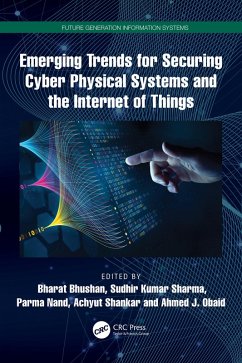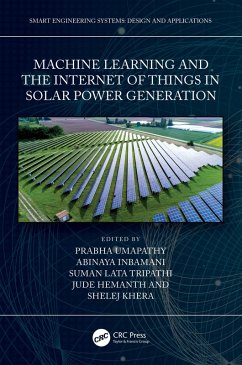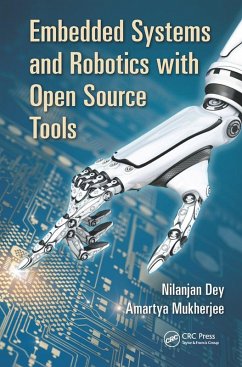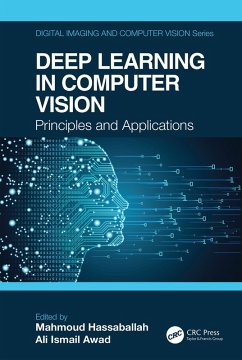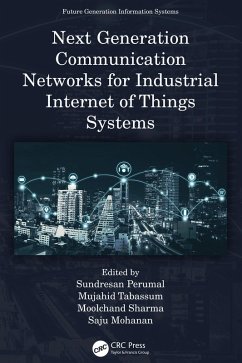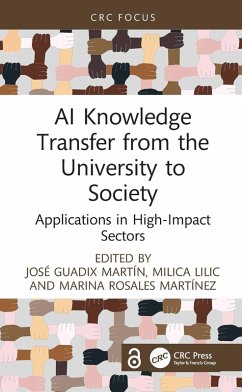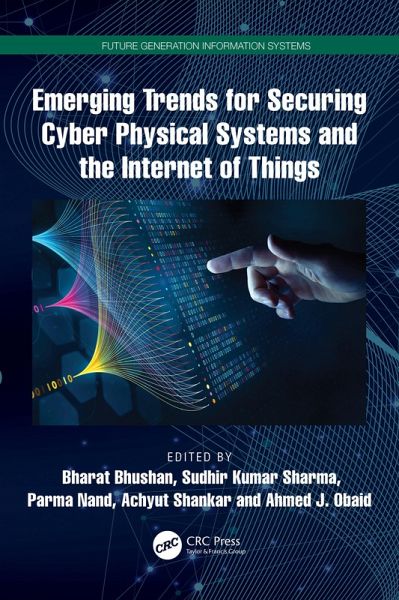
Emerging Trends for Securing Cyber Physical Systems and the Internet of Things (eBook, PDF)
Versandkostenfrei!
Sofort per Download lieferbar
52,95 €
inkl. MwSt.
Weitere Ausgaben:

PAYBACK Punkte
26 °P sammeln!
In the past decades, cyber-physical systems (CPSs) have been widely applied to fields such as smart grids, environment monitoring, aerospace, smart transportation, and industrial automation. Great strides have been made in CPSs to improve the computing mechanism, communication, and quality of service by applying optimization algorithms. Currently, these efforts are integrated with the applications of machine learning (ML) and artificial intelligence (AI). To maintain system reliability and stability, CPSs such as smart grids face numerous challenges, including large-scale Internet-of-Things (I...
In the past decades, cyber-physical systems (CPSs) have been widely applied to fields such as smart grids, environment monitoring, aerospace, smart transportation, and industrial automation. Great strides have been made in CPSs to improve the computing mechanism, communication, and quality of service by applying optimization algorithms. Currently, these efforts are integrated with the applications of machine learning (ML) and artificial intelligence (AI). To maintain system reliability and stability, CPSs such as smart grids face numerous challenges, including large-scale Internet-of-Things (IoT) device adaptation, ever-increasing demands of electrical energy, and the rise of a wide range of security threats. These challenges bring forth the need to find sustainable and advanced solutions to guarantee reliable and secure operations in these systems.
The goal of this book is to foster transformative, multidisciplinary, and novel approaches that ensure CPS security by taking into consideration the unique security challenges present in the environment. This book attracts contributions in all aspects pertaining to this multidisciplinary paradigm, which includes the development and implementation of Smart CPS, Supervisory Control and Data Acquisition (SCADA) systems, CPS for Industry 4.0, CPS architecture for IoT applications, and CPS forensics.
This book:
Owing to the scope and diversity of topics covered, the book will be of interest not only to researchers and theorists but also to professionals, material developers, technology specialists, and methodologists dealing with the multifarious aspects of data privacy and security enhancement in CPSs. The book will provide these professionals an overview of CPS security and privacy design, as well as enlighten them to promising solutions to research problems such as cyberattacks in CPS, risk identification and management in CPS, ML-based trust computational models for CPSs, nature-inspired algorithms for CPSs, and distributed consensus algorithms for event detection in CPSs. The secondary target audience of this book includes legal practitioners, hackers, cyber law policymakers, cyber forensic analysts, and global security consortiums who may use it to further their research exposure to pertinent topics in cybersecurity.
The goal of this book is to foster transformative, multidisciplinary, and novel approaches that ensure CPS security by taking into consideration the unique security challenges present in the environment. This book attracts contributions in all aspects pertaining to this multidisciplinary paradigm, which includes the development and implementation of Smart CPS, Supervisory Control and Data Acquisition (SCADA) systems, CPS for Industry 4.0, CPS architecture for IoT applications, and CPS forensics.
This book:
- Discusses concepts including wireless sensor networks (WSNs), CPSs, and the IoT in a comprehensive manner.
- Covers routing protocols in sensor networks, attacks, and vulnerabilities in WSNs, the Internet of Cyber-Physical Things, and CPSs for industrial applications.
- Highlights technological advances, practical solutions, emerging trends, and prototypes related to privacy in CPSs and the IoT.
- Presents a pathway and architecture for proactive security schemes in CPSs to counter vulnerabilities, including phishing attacks, malware injection, internal stealing of data, and hacking.
- Discusses the most recent research and development on the enabling technologies for IoT-based CPSs.
Owing to the scope and diversity of topics covered, the book will be of interest not only to researchers and theorists but also to professionals, material developers, technology specialists, and methodologists dealing with the multifarious aspects of data privacy and security enhancement in CPSs. The book will provide these professionals an overview of CPS security and privacy design, as well as enlighten them to promising solutions to research problems such as cyberattacks in CPS, risk identification and management in CPS, ML-based trust computational models for CPSs, nature-inspired algorithms for CPSs, and distributed consensus algorithms for event detection in CPSs. The secondary target audience of this book includes legal practitioners, hackers, cyber law policymakers, cyber forensic analysts, and global security consortiums who may use it to further their research exposure to pertinent topics in cybersecurity.
Dieser Download kann aus rechtlichen Gründen nur mit Rechnungsadresse in A, B, BG, CY, CZ, D, DK, EW, E, FIN, F, GR, HR, H, IRL, I, LT, L, LR, M, NL, PL, P, R, S, SLO, SK ausgeliefert werden.




